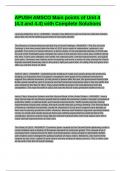Exam (elaborations)
APUSH AMSCO Main points of Unit 4 (4.3 and 4.4) with Complete Solutions
- Course
- Institution
APUSH AMSCO Main points of Unit 4 (4.3 and 4.4) with Complete SolutionsAPUSH AMSCO Main points of Unit 4 (4.3 and 4.4) with Complete SolutionsAPUSH AMSCO Main points of Unit 4 (4.3 and 4.4) with Complete SolutionsAPUSH AMSCO Main points of Unit 4 (4.3 and 4.4) with Complete Solutions Learning Obje...
[Show more]



